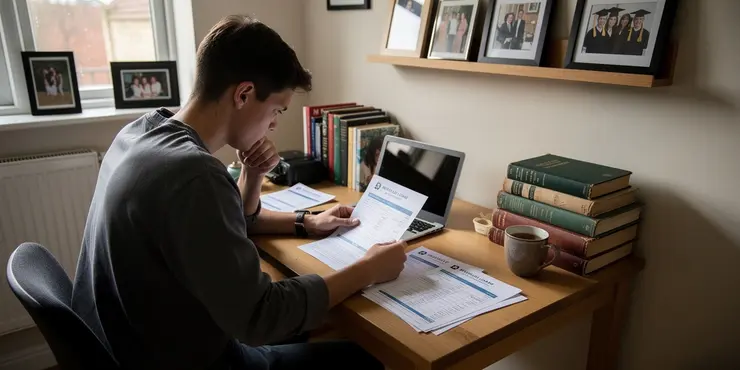
Find Help
More Items From Ergsy search
-
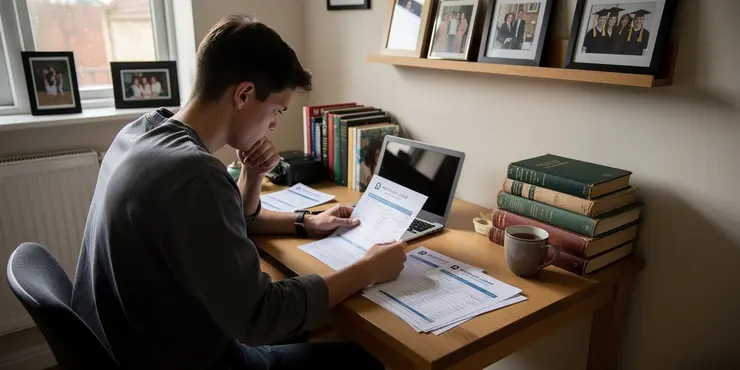
Are there implications for student loan repayments with 2026 changes?
Relevance: 100%
-

What happens if i can not afford to repay my student loan?
Relevance: 66%
-

What should I do if I can't afford to repay my student loan?
Relevance: 63%
-

Can I get my student loans forgiven if I can't repay them?
Relevance: 62%
-

UNDERSTANDING YOUR STUDENT LOAN: A GUIDE FOR ENGLISH STUDENTS STARTING AN UNDERGRADUATE COURSE 2023
Relevance: 55%
-

What happens if I default on my student loan?
Relevance: 55%
-

Is bankruptcy an option for student loan discharge?
Relevance: 54%
-

Can interest rates on student loans be reduced?
Relevance: 53%
-

Can my wages be garnished for unpaid student loans?
Relevance: 51%
-

Can my loan repayment terms be renegotiated?
Relevance: 51%
-
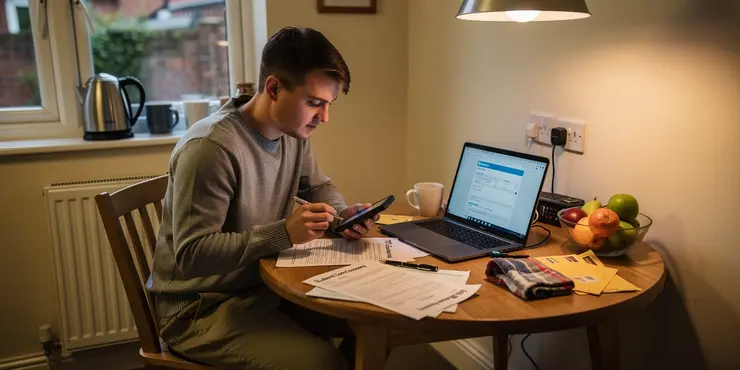
Can I negotiate a settlement for my student loan?
Relevance: 51%
-

How does loan consolidation help with repayment?
Relevance: 50%
-
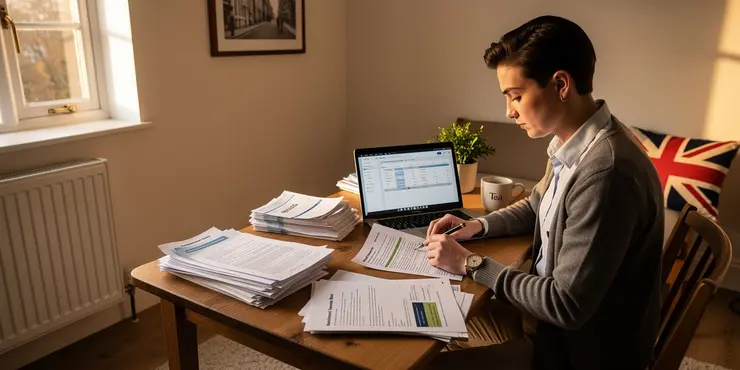
What is an income-driven repayment plan?
Relevance: 46%
-

How does missing student loan payments affect my credit score?
Relevance: 44%
-

Student Finance: Should I pay more? | Plan 1 & Plan 2 | SF Explained
Relevance: 43%
-

What are HMRC Income Tax Changes in April 2026?
Relevance: 41%
-

What happens to my loans if I go back to school?
Relevance: 41%
-
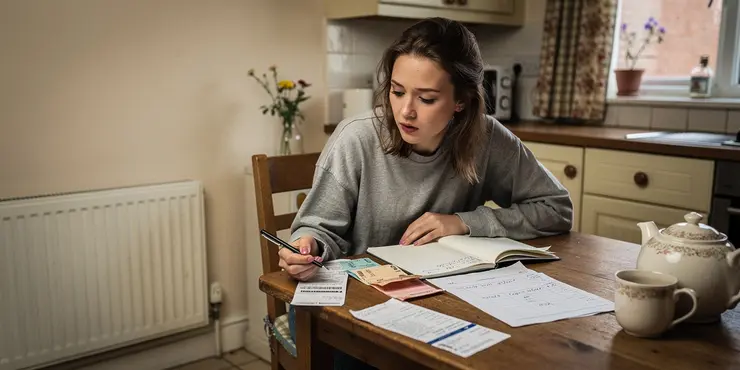
What is loan rehabilitation?
Relevance: 41%
-

What are the HMRC income tax changes coming into effect in April 2026?
Relevance: 39%
-

Does applying for an income-driven repayment plan affect my credit score?
Relevance: 38%
-

What funding options are available for nursing students in the UK?
Relevance: 36%
-

How do I qualify for public service loan forgiveness?
Relevance: 36%
-

Are there further changes expected after 2026?
Relevance: 35%
-

Do I need to repay the EV grant?
Relevance: 35%
-
Has the process for adoption changed in 2026?
Relevance: 35%
-

How are self-assessment taxpayers affected by the 2026 changes?
Relevance: 34%
-
Are there any changes to spousal support regulations in 2026?
Relevance: 33%
-
What are the changes to Family Court Law in 2026?
Relevance: 33%
-
Have the rules for changing a child's name in family court changed in 2026?
Relevance: 33%
-

Is there a change in National Insurance rates for 2026?
Relevance: 33%
-

How will dividend taxation change in April 2026?
Relevance: 33%
-
What is the impact of the 2026 changes on grandparent visitation rights?
Relevance: 33%
-

How does the payment affect students' financial aid packages?
Relevance: 32%
-

Are there changes expected for tax credits in April 2026?
Relevance: 32%
-

What are the state pension age changes in 2026 in the UK?
Relevance: 32%
-

How soon should I prepare for the 2026 tax changes?
Relevance: 32%
-

Are there any changes to the state pension age in 2026?
Relevance: 31%
-
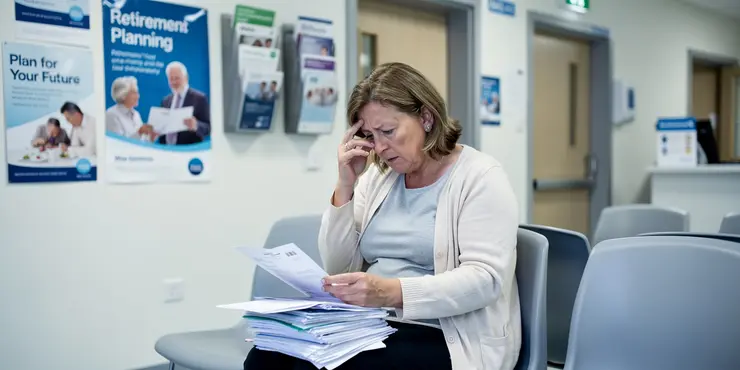
Who will be affected by the state pension age changes in 2026?
Relevance: 31%
-
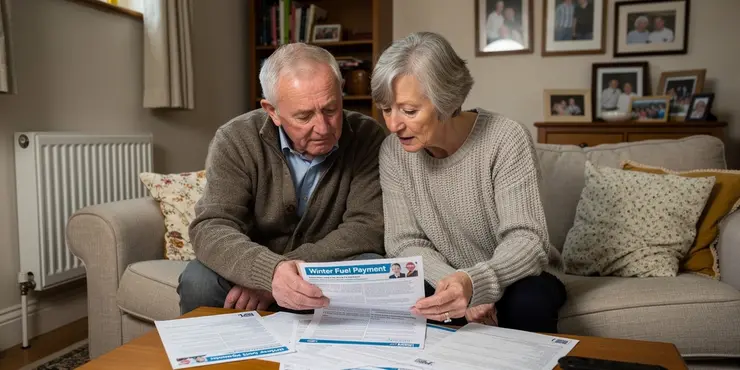
Do I have to repay the Winter Fuel Payment if my circumstances change after I've received it?
Relevance: 31%
-
How have child custody laws changed in 2026?
Relevance: 31%
Introduction
In recent years, the UK government has introduced various changes to the student loan system impacting current and future graduates. As we approach 2026, there are questions about how impending changes could affect loan repayments for students. Understanding these implications is crucial for students, graduates, and parents as they plan for financial stability.
Changes to the Student Loan System
The student loan system in the UK periodically undergoes reforms to align with economic realities and government policy objectives. From 2026, there are anticipated changes primarily focusing on repayment terms, interest rates, and plan structures. These changes aim to balance the cost of higher education with the need for fiscal responsibility from graduates who have benefited from university education.
Potential Implications for Repayments
One of the significant changes anticipated in 2026 could involve the repayment threshold. Currently, Plan 2 loans require repayments when a graduate's income exceeds £27,295, but this threshold might be lowered. A lower threshold means graduates start repaying their loans earlier, thereby increasing monthly repayment amounts, yet potentially reducing the overall repayment period.
Another key area of change could be the interest rates applied to loans. Currently, interest rates vary based on income levels, with higher earners paying more interest. The 2026 changes might standardize interest rates or adjust them to reflect inflation or economic conditions more closely. This move aims to ensure fairness while maintaining fiscal sustainability.
Impact on Different Loan Plans
Various student loan plans exist, distinguished by when and where students took out loans. Plans 1, 2, and the postgraduate loan plan each have unique terms. Changes in 2026 are likely to focus on Plan 2 loans, which encompass the majority of students in England and Wales. Scotland and Northern Ireland may adopt different policies due to devolved education powers.
Understanding which plan a loan falls under is critical. For Plan 1 loans, whose terms are significantly different, the impact might be less direct, while for Plan 2 borrowers, changes to thresholds and interest rates will be felt more immediately once implemented.
Considerations for Borrowers
Students and graduates should prepare for these changes by reviewing their current financial situation and potential future earnings. Awareness and understanding of ongoing policy discussions and potential reforms can help borrowers make informed decisions regarding their careers and finances.
It is advisable for borrowers to regularly check their loan statements and consult official resources or financial advisors to anticipate how the 2026 changes might affect them financially. By doing so, they can strategize better repayment plans and potentially minimize the long-term financial impact.
Conclusion
The 2026 changes to the UK student loan system hold significant implications for how loans are repaid. Graduates should stay informed about these developments, which, although potentially increasing short-term repayment burdens, could lead to a more equitable and sustainable student loan system in the long run.
Introduction
The UK government is changing the student loan system. These changes affect students and graduates. By 2026, new rules will change how people pay back their student loans. Understanding these changes is important for students, graduates, and parents. It helps them plan their money better.
Changes to the Student Loan System
Sometimes, the UK changes how student loans work to match the economy and the government’s plans. In 2026, there will be changes to how loans are repaid, the interest rates, and the loan plans. These changes aim to make higher education costs fair for everyone. They also want graduates to pay for their education in a responsible way.
Potential Implications for Repayments
One big change in 2026 might be how much money graduates need to earn before they start paying back their loans. Right now, for Plan 2 loans, repayments start when income is over £27,295. This amount might go lower. If it does, students will start paying back loans sooner, but they might finish paying sooner too.
Interest rates on loans might change as well. At the moment, people with higher incomes pay more interest. In 2026, new rules might make interest rates the same for everyone or change based on the economy to make it fairer and sustainable.
Impact on Different Loan Plans
There are different types of student loans based on when and where students got them. Plans 1, 2, and the postgraduate plan each have different rules. Changes in 2026 will mainly focus on Plan 2, which most students in England and Wales have. Scotland and Northern Ireland might have different rules.
It's important to know which plan you have. Plan 1 has different rules and might not feel these changes as much. But for Plan 2, changes to money limits and interest will be noticeable soon.
Considerations for Borrowers
Students and graduates should look at their finances now and think about future earnings. Knowing about changes can help make smart choices about careers and money. It's good to check loan statements often and look for help from official sources or money experts. This way, you can plan how to pay back loans smartly and save money.
Conclusion
The changes coming in 2026 to the UK student loan system are important for paying back loans. Even if payments might be more at first, these changes aim to be fairer and help make the system better. Graduates should keep up with the news to manage their loans wisely.
Frequently Asked Questions
What changes to student loan repayments are expected in 2026?
The specific changes to student loan repayments in 2026 will depend on legislative and policy adjustments. It is advised to stay informed through official government announcements.
Will interest rates on student loans change in 2026?
Interest rates can be influenced by both legislative changes and market conditions. Any changes to interest rates would be communicated by the Department of Education or respective loan servicers.
How will repayment plans be affected by the 2026 changes?
Repayment plans could be restructured or adjusted based on new policies. Details will emerge once the changes are officially announced.
Could the 2026 changes provide any relief for borrowers?
Potential policy changes could include measures aimed at providing relief, such as extended repayment terms or revised income thresholds, but specifics would depend on the enacted policies.
Will forgiveness programs be affected by the 2026 changes?
Forgiveness programs like PSLF could see adjustments based on policy updates. It's important to follow updates from the Department of Education for accurate information.
Are there expected changes to income-driven repayment plans in 2026?
Changes to income-driven repayment plans could occur, potentially altering payment calculations or eligibility. Official announcements will provide clarity when decisions are finalized.
How should borrowers prepare for potential changes in 2026?
Borrowers should stay informed about policy updates, review current repayment plans, and consult financial advisors if needed, to ensure they're prepared for any adjustments.
Will the eligibility criteria for student loans change in 2026?
Eligibility criteria may be revised as part of broader financial aid reforms, but this would be specified in official policy announcements.
Are there any predicted benefits for current students due to the 2026 changes?
If changes aim to reduce the financial burden, current students might benefit from more favorable terms or increased access to forgiveness options, though details will depend on the final changes.
Could the 2026 changes shorten the repayment period for loans?
Policies might offer options for accelerated repayment or shorter terms, but specific changes would be clarified upon implementation of any new regulations.
What role does Congress play in the 2026 changes to student loans?
Congress would be involved in legislative changes affecting student loans, potentially passing laws that modify terms, rates, or eligibility.
Will private student loans be affected by the 2026 changes?
Changes typically apply to federal student loans. Private loans are subject to their own terms, though broader legislation might have indirect effects.
How can borrowers stay informed about the 2026 changes?
Borrowers can follow the Department of Education's updates, subscribe to financial news outlets, and engage with online forums discussing student loan policy changes.
Will the 2026 changes impact future borrowing limits?
Borrowing limits could be reassessed, possibly increasing or decreasing based on policy objectives to manage student debt burdens.
Are there expected changes to the loan origination fees in 2026?
Loan origination fees could be adjusted as part of the 2026 changes, contingent on budgetary and policy goals.
How will the changes affect borrowers who are in default?
Policies may introduce new pathways for rehabilitation or restructuring defaulted loans to help borrowers regain good standing.
What is the expected impact on Parent PLUS loans from the 2026 changes?
Parent PLUS loans might see adjustments, particularly in terms of repayment flexibility or interest rates, following any policy shifts.
Will deferment and forbearance options be revised in the 2026 changes?
Deferment and forbearance terms could be reviewed, potentially altering how borrowers can pause or reduce payments in certain circumstances.
Is there a possibility of expanded loan forgiveness in any proposed 2026 changes?
Expanding loan forgiveness options could be a component of the policy changes, aimed at alleviating debt burdens for eligible borrowers.
What is the timeline for learning about the final 2026 changes?
Details should be finalized and communicated well in advance of 2026, allowing borrowers time to adjust and plan accordingly.
What will change for student loan payments in 2026?
Student loan payments might be different in 2026. Let's see what might be new or different:
- How much you pay back each month could change.
- The time you have to pay back the loan might be longer or shorter.
- New rules might say when you start paying back.
If you find it hard to understand, you can:
- Ask someone to explain it to you.
- Use a calculator to help with numbers.
- Look for simple videos or pictures online that explain it.
In 2026, the way students pay back their loans might change. These changes will depend on new laws and rules. It’s a good idea to pay attention to news from the government to know what will happen.
Will student loan interest rates change in 2026?
We want to know if the cost to borrow money for student loans will be different in 2026.
Here are some things that might help you understand better:
- Interest rate: This is the extra money you pay when you borrow money.
- Student loan: This is money you borrow to pay for school.
- Change: This means it could be more or less than before.
If you need help, you can:
- Ask a teacher or family member to explain.
- Use a calculator to see how much more or less you might pay.
Interest rates can change because of new rules or how the market is doing. If interest rates change, the Department of Education or your loan company will let you know.
What will happen to repayment plans in 2026?
In 2026, the way you pay back money you owe might change. Here are some simple ways to understand what could happen:
- The rules for paying back money might be different.
- You might have to pay a different amount each month.
- The time you have to pay back could be longer or shorter.
Here are some ways to get help:
- Ask someone you trust to explain the changes.
- Use a calculator to help you see how much you need to pay.
- Write down what you need to do so you don't forget.
Repayment plans might change because of new rules. We will know more when the changes are shared with everyone.
Will the 2026 changes help people who borrowed money?
There might be new rules to help people. These could make it easier to pay back money or change how much money you need to earn to get help. We will know more when the new rules are made.
Will forgiveness programs change in 2026?
In 2026, some rules might change. This could affect forgiveness programs. Forgiveness programs help people who owe money. We don't know exactly what will change yet. It's good to stay informed and ask for help if you need it.
Here are some ways to get help:
- Ask a teacher or friend to explain things.
- Use websites that make information simple.
- Watch videos that explain changes.
Forgiveness programs like PSLF might change because of new rules. It's important to check for news from the Department of Education to get the right information.
Will income-driven repayment plans change in 2026?
Yes, there might be changes to how you pay back money you borrowed for education in 2026. These plans help you pay based on how much money you earn.
If you find reading hard, you can:
- Ask someone you trust to explain it to you.
- Use an online tool that reads the text out loud for you.
- Break the question into smaller parts to understand it better.
There might be changes to how people pay back money they borrowed for school. These changes could be about how much you have to pay or who can get the special payment plans. We will know more when the people in charge make a final decision and tell everyone.
What should people do to get ready for changes in 2026?
If you have borrowed money, changes might happen in 2026. Here are some ways to get ready:
- Talk to someone who knows about money. They can help you understand changes.
- Read letters or emails from your bank. They will tell you important news.
- Save a little money each month in case you need it later.
- Use a calendar to mark dates when changes might happen.
- Ask for help if you don’t understand something. It’s okay to ask.
These steps can help you feel ready for 2026.
If you have borrowed money, it is important to know the new rules. Check your payment plan to make sure it is right for you. If you need help, talk to a money expert. This will help you be ready if things change.
Will the rules for getting student loans change in 2026?
The rules for who can get financial help might change. If they do, the government will tell everyone in an official message.
How will the 2026 changes help students now?
The 2026 changes might help students in a few ways:
- Better ways to learn new things.
- Teachers might have new ways to teach.
- Schools could have more tools for learning.
Here are some tips to help with learning:
- Use colorful pictures to understand information.
- Ask for help if something is hard to understand.
- Practice little by little every day.
If the changes are to make things cheaper, students might get better deals or have more ways to get their loans forgiven. We will know more when the changes are final.
Will the 2026 changes make it faster to pay back loans?
Using simpler words makes it easier to understand. Try to read slowly and take your time.
If you need help, you can:
- Ask someone to explain it to you.
- Use tools that read text out loud.
- Look for videos that explain it in an easy way.
Policies might give choices to pay back faster or in a shorter time. But clear details would be shared when new rules start.
What does Congress do with student loans in 2026?
In 2026, some things are changing with student loans. Congress is a group of important people who help make the country's rules. They will work on these changes.
If you want help understanding more, you can:
- Use a dictionary to look up words.
- Ask a teacher or family member.
- Use apps that read text aloud.
Congress makes important rules about student loans. They might change how loans work, how much they cost, or who can get them.
Will private student loans change in 2026?
Changes usually happen to federal student loans. Private loans have their own rules, but new laws might change them too.
How can people who borrow money know about the 2026 changes?
Here is how you can find out about changes in 2026:
- Ask a friend or family member to help explain new rules.
- Use simple apps and websites to get news.
- Look at easy-to-read posters or flyers in banks.
Tools like talking apps or videos can also help you understand better.
People with student loans can do three things to keep up with news:
- Check the Department of Education's updates.
- Sign up for news about money and loans.
- Join online chats where people talk about student loans.
These things can help you know about changes and what to do next.
Will the 2026 changes affect how much I can borrow in the future?
How much money you can borrow might change. It could go up or down. This depends on rules to help manage student debt (money owed).
Will the cost to start a loan change in 2026?
Loan start fees might change in 2026, depending on money plans and rules.
What will happen to people who can't pay back their loans?
Policies might create new ways to help people who are having trouble with their loans. This can help them fix their loans and get back on track.
How will Parent PLUS loans change in 2026?
In 2026, some changes will happen to Parent PLUS loans. Let's talk about how these loans might be different.
Here are some easy tools to help understand:
- Ask for Help: Talk to a teacher or a parent if you have questions.
- Use Simple Words: Break down hard words into easy ones.
Remember, taking small steps can make things clearer!
Some changes might happen with Parent PLUS loans. These changes could make it easier to pay back the money. The interest rates could also change if the rules do.
Will the rules for pausing payments change in 2026?
The rules for stopping payments might change in 2026. This is called deferment or forbearance. These rules help people who can't pay money they owe.
If you have trouble reading, you can:
- Ask someone to read it to you.
- Use a tool that reads text out loud.
- Highlight or underline important parts.
People might change the rules for stopping or lowering their loan payments. This helps if you are having money problems.
Will there be more loan forgiveness in 2026?
Making it easier to forgive loans might be part of the new rules. This would help people who have a lot of debt.
When will we learn about the changes for 2026?
Here is how you can understand the changes:
- Use short and simple words.
- Break down information into small chunks.
- Use pictures or diagrams to help explain.
These steps can help make the information clear and easy.
We need to finish and share all the important details before 2026. This gives people enough time to get ready and make plans.
Useful Links
This website offers general information and is not a substitute for professional advice.
Always seek guidance from qualified professionals.
If you have any medical concerns or need urgent help, contact a healthcare professional or emergency services immediately.
Some of this content was generated with AI assistance. We’ve done our best to keep it accurate, helpful, and human-friendly.
- Ergsy carfully checks the information in the videos we provide here.
- Videos shown by Youtube after a video has completed, have NOT been reviewed by ERGSY.
- To view, click the arrow in centre of video.
- Most of the videos you find here will have subtitles and/or closed captions available.
- You may need to turn these on, and choose your preferred language.
- Go to the video you'd like to watch.
- If closed captions (CC) are available, settings will be visible on the bottom right of the video player.
- To turn on Captions, click settings .
- To turn off Captions, click settings again.
More Items From Ergsy search
-

Are there implications for student loan repayments with 2026 changes?
Relevance: 100%
-

What happens if i can not afford to repay my student loan?
Relevance: 66%
-

What should I do if I can't afford to repay my student loan?
Relevance: 63%
-

Can I get my student loans forgiven if I can't repay them?
Relevance: 62%
-

UNDERSTANDING YOUR STUDENT LOAN: A GUIDE FOR ENGLISH STUDENTS STARTING AN UNDERGRADUATE COURSE 2023
Relevance: 55%
-

What happens if I default on my student loan?
Relevance: 55%
-

Is bankruptcy an option for student loan discharge?
Relevance: 54%
-

Can interest rates on student loans be reduced?
Relevance: 53%
-

Can my wages be garnished for unpaid student loans?
Relevance: 51%
-

Can my loan repayment terms be renegotiated?
Relevance: 51%
-

Can I negotiate a settlement for my student loan?
Relevance: 51%
-

How does loan consolidation help with repayment?
Relevance: 50%
-

What is an income-driven repayment plan?
Relevance: 46%
-

How does missing student loan payments affect my credit score?
Relevance: 44%
-

Student Finance: Should I pay more? | Plan 1 & Plan 2 | SF Explained
Relevance: 43%
-

What are HMRC Income Tax Changes in April 2026?
Relevance: 41%
-

What happens to my loans if I go back to school?
Relevance: 41%
-

What is loan rehabilitation?
Relevance: 41%
-

What are the HMRC income tax changes coming into effect in April 2026?
Relevance: 39%
-

Does applying for an income-driven repayment plan affect my credit score?
Relevance: 38%
-

What funding options are available for nursing students in the UK?
Relevance: 36%
-

How do I qualify for public service loan forgiveness?
Relevance: 36%
-

Are there further changes expected after 2026?
Relevance: 35%
-

Do I need to repay the EV grant?
Relevance: 35%
-
Has the process for adoption changed in 2026?
Relevance: 35%
-

How are self-assessment taxpayers affected by the 2026 changes?
Relevance: 34%
-
Are there any changes to spousal support regulations in 2026?
Relevance: 33%
-
What are the changes to Family Court Law in 2026?
Relevance: 33%
-
Have the rules for changing a child's name in family court changed in 2026?
Relevance: 33%
-

Is there a change in National Insurance rates for 2026?
Relevance: 33%
-

How will dividend taxation change in April 2026?
Relevance: 33%
-
What is the impact of the 2026 changes on grandparent visitation rights?
Relevance: 33%
-

How does the payment affect students' financial aid packages?
Relevance: 32%
-

Are there changes expected for tax credits in April 2026?
Relevance: 32%
-

What are the state pension age changes in 2026 in the UK?
Relevance: 32%
-

How soon should I prepare for the 2026 tax changes?
Relevance: 32%
-

Are there any changes to the state pension age in 2026?
Relevance: 31%
-

Who will be affected by the state pension age changes in 2026?
Relevance: 31%
-

Do I have to repay the Winter Fuel Payment if my circumstances change after I've received it?
Relevance: 31%
-
How have child custody laws changed in 2026?
Relevance: 31%


